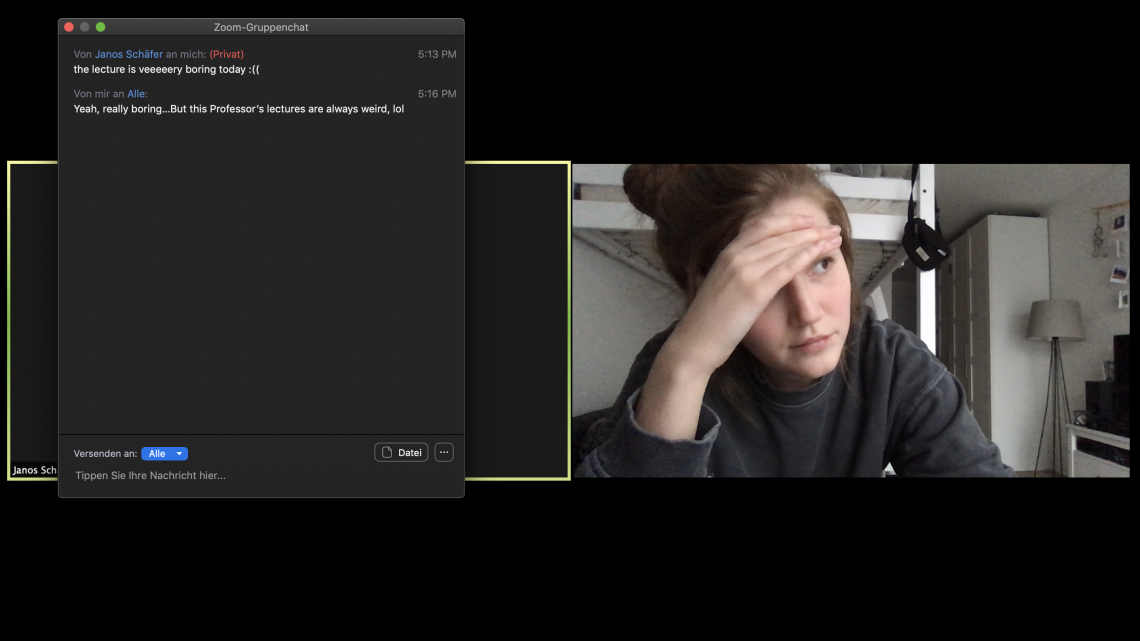Corona – A term that was used very often last year and unfortunately still determines our lives every day. This virus has changed the world – in the short and long term. Some changes probably will remain and the world may never be the same again.
Universities also had to react to the circumstances of the pandemic in a short matter of time. Online courses and seminars were supposed to be a solution for the transition. This experience was new for students and professors in the same way. However, this experience taught us more than how to study online: How to deal with technical difficulties. How to improvise in unusual situations and what digital possibilities can be adopted in the future?
Most of the things we learned in the process, we had to learn the hard way – while making mistakes. The online tool Zoom was new to almost everyone. Nevertheless, all of a sudden every event was online, even though we didn’t really know how to use it and how Zoom works. That is also the reason why things turned out the way they did.
Many of us had the experience of being stuck in the Zoom queue. If you’re ever late for a lecture at the university, it’s inconvenient but at least it’s always possible. However, if you are late for an online lecture, the professor may overlook your request to enter the meeting and you will be stuck forever and miss a lot. This is annoying and frustrating.
But this is just one example of a new situation that has changed in online teaching. We constantly ask ourselves whether the microphone is turned on, whether the internet connection is good enough or whether the flatmates are listening to loud music in the kitchen while an exam has to be written online? So many reasons that make a trouble-free Zoom meeting. There are so many new aspects that have become part of our everyday life which took a while to get used to. Of course, Zoom also brings opportunities, but all this was not foreseeable. Some fellow students took advantage of the chances and made the most of them. There were participants who sat in the car during their lectures or went to the gym.
Another observation is that our thoughts wander elsewhere in an online lecture. Suddenly, completely different things seem reasonable to think of: “What do my fellow students think about my room? Is it too messy? I’d rather leave the camera out. But isn’t that rude? Well, I’m not the only one. I’ll quickly make myself another cup of tea and then I’ll really turn the camera on!”
The Zoom Chat is another function that often encounters problems. Important tip: Always check first whether you have really set a message to a fellow student to “private”. Your professor is probably not happy to find out via the chat, whether you find the topic boring and whether his new glasses suit him or not. Well, but maybe that’s not a problem of Zoom, but rather one of a human error.
What do we learn from this? We shouldn’t waste our time condemning other people for their zoom failures. We should try to see the positive in it. Fortunately, the situation is new for almost everyone. Therefore, we should be tolerant, understand each other and help each other with problems. This way we will get closer to each other and respect each other. Each of us has struggles with the situation and is certainly tired of sitting alone in their four walls, staring at the computer and keeping contacts to a minimum. Even if we always try to have a professional atittude, it isn’t always possible and sometimes we just break out of our role. In the end, thats what Zoom-Fails really are. Not a stupid mistake or a human error, just a closer look into peoples lifes and their feelings. From that point of view, Zoom-Fails are bringing us closer together – Teachers as well as students.
![FHews – [ fju:s]](http://fhews.de/wp-content/uploads/2015/05/fhews_logo2_3B8ACC.jpg)









No Comment